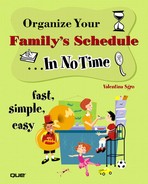Chapter 12. Dealing with Eldercare
In this chapter:
Integrating eldercare responsibilities into your schedule
Managing your elder's medical care
Knowing where to go for assistance
More people are living longer lives. This advance has resulted in more people who must care for both their children and their parents—the so-called “sandwich generation.” In many ways, caring for an elderly relative is no different than caring for any other family member: It's a simple matter of making sure someone takes care of the elder's needs and wants.
On the other hand, several aspects of eldercare set it apart from child care or personal care:
A role reversal takes place. Many people—whether the person needing care or the person providing care—find it difficult to accept that an adult who was once self-sufficient and nurtured others now needs help.
The need may arise suddenly. Unlike the expected arrival of a new baby, you rarely expect the events—or the timing of the events—that result in the need for eldercare.
The ultimate outcome is not desirable. The need for ongoing care signals that the elder has entered a state of decline that, for the caregiver, can be emotionally draining.
Dealing with the psychological aspects of finding oneself in the role of caregiver is important, but it isn't the focus of this book. What we'll discuss here is how to adjust your family's schedule to handle your new responsibilities. You'll probably find that from a time-management standpoint, eldercare isn't as difficult as you thought it would be. In fact, a recent survey by the American Association of Retired Persons (AARP) concluded that family caregivers as a whole were less stressed, more self-assured, and more at ease in their roles than not.
